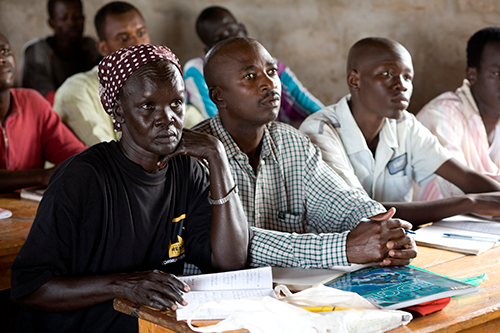Windle Trust International
Upskilling large numbers of teachers in South Sudan
Windle Trust International (WTI) provides education and training for communities affected by conflict, discrimination and displacement in Eastern and Horn of Africa.
 In South Sudan, the charity identified that the education system faced a double whammy of insufficient numbers of, and lack of qualifications for, teachers. In 2017, gross enrolment in secondary education was just 5% (as low as 1% for girls in certain regions), with the result that the country’s workforce, particularly the teaching workforce, is drastically underqualified – and just 15% are female.
In South Sudan, the charity identified that the education system faced a double whammy of insufficient numbers of, and lack of qualifications for, teachers. In 2017, gross enrolment in secondary education was just 5% (as low as 1% for girls in certain regions), with the result that the country’s workforce, particularly the teaching workforce, is drastically underqualified – and just 15% are female.
In 2023, only 52% of primary school teachers had a teaching certificate, meaning that 14,000 primary teachers were untrained, and of these, around half had not even finished secondary school education themselves. Without a secondary certificate of education, these teachers were not even eligible for teacher training. Yet the teaching workforce needed to double in size to meet demand.
The objective of WTI’s Accelerated Secondary Education Programme (ASEP), devised in collaboration with the country’s education ministry, was to enable practising primary school teachers to complete their secondary schooling in two years instead of the usual four, while still carrying out their current teaching jobs. At the end of this, they would then be eligible to train for teaching qualifications.
The programme was also extended to vulnerable women interested in becoming teachers.
WTI’s efforts to collaborate with the government meant that ASEP was approved as an official amendment to existing policy, ensuring that sustainable systemic change would be embedded into the education system.
Except for one seasoned educational advisor from the UK with knowledge of the regional context, ASEP was facilitated by South Sudanese nationals, paying respect to existing frameworks and contexts. The programme has been delivered in 51 centres, and so far 2,286 people – more than 30% of them women, more than double the national average – have completed their secondary education. Some 772 individuals achieved grades high enough to qualify for further study.
Participants reported that their teaching had improved due to greater subject knowledge, especially of English grammar, and they were now using more advanced teaching methods in their classrooms.
The success of ASEP, which cost £873,000 or £275 per learner, has now prompted South Sudan’s Western Bahr El Ghazal state to fund its own ASEP centre, with a pilot involving 205 learners. And WTI is now scaling up the programme with two large donor-funded projects due to launch this year, for teachers and Sudanese refugees.
Charity Awards judge Shane Ryan, senior adviser to the National Lottery Community Fund, said the ASEP programme tackles multiple interconnected issues: the severe shortage of qualified teachers, limited access to secondary education, and significant gender disparities. “This represents an outstanding example of thoughtful, contextually-appropriate international development that builds local capacity and addresses root causes rather than symptoms.”
CC Reg. no. 1092834

